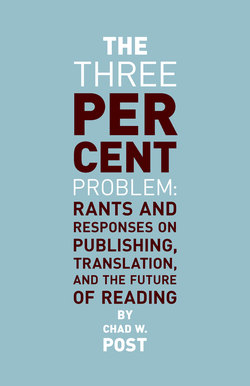Читать книгу The Three Percent Problem - Chad W. Post - Страница 10
На сайте Литреса книга снята с продажи.
Interlude:
Making an
Arch-Nemesis
ОглавлениеThe one panel from NYRB’s Sunflower event in 2007 that hasn’t gotten a lot of coverage online is the Editors Buzz Panel. Consisting of French, German, and American editors (and Scott Moyers from Wylie—lot more below), this panel was an opportunity to highlight some really interesting forthcoming books.
Paul Otchakovsky-Laurens talked about Marie Darrieussecq’s latest book (which is the subject of a fascinating controversy; Jenna Johnson from Harcourt talked about I Have the Right to Destroy Myself and Michael Zollner from Tropen Verlag presented a book called What We Talk about When We Talk about Doping.
All the presentations were great, but what most got me going was Scott Moyers opening comments about fiction in translation. As someone who worked at Random House, Penguin, and now Wylie, he’s come into contact with a lot of big international authors. And I’m sure he’s a nice guy. But the things he said at the panel were a perfect example of how commercial publishing treats “international fiction” as a pure commodity and basically undercut a lot of the good interactions that happened earlier in the days.
First off, he started talking about W. G. Sebald’s Austerlitz, and that although Sebald had been “getting his name out there a bit,” this was an opportunity for Random House to put the “stamp of authority” on Sebald as a great European writer. Which is pretty inaccurate. New Directions (and Harvill in the UK) had been publishing Sebald for years and had already cultivated a huge reputation for him. Sebald was by no means unknown when Random House wrested the rights to Austerlitz away from New Directions in what seemed to be a pretty savage business move better suited to Wall Street than literary publishing. But RH saw an opportunity—not to promote Sebald, but to capitalize on him.
The next book he mentioned was The Shadow of the Wind by Carlos Ruiz Zafon. Which is a book with some merit, but not really the “great Barcelona novel” that it was portrayed as. But that’s an aesthetic debate, and it may be because I can name more than a dozen Spanish/Catalan writers that I have a slightly different perspective on where this fits in the Spanish literary tradition than Scott does.
What bugged me though was his insistence that, like with Esquivel’s Like Water for Chocolate, The Shadow of the Wind sent publishers rushing to find other Spanish novelists writing just like him. Even if true, that precisely describes one of the things wrong with American publishing. This sort of pigeonholing, this looking to replicate what “worked” leads to the publication of a lot of pale imitations that are generally uninteresting and create the viewpoint that all fiction from country X is all the same.
All of these events—like everything the French American Foundation, the French Cultural Services, and the German Book Office do—were designed to promote a widening appreciation of literature from other cultures. But this perspective that Scott presented—which actually is pretty dominant in the marketplace—represents the exact opposite. Instead of appreciating art from other cultures, these publishers treat these books as commodities. The Shadow of the Wind is great because it sold well, not necessarily because it’s a great book.
There’s nothing wrong with for profit companies running their business in profitable ways, but in my opinion, expressing such a condescending, somewhat ignorant viewpoint at such a panel designed to celebrate cultural exchanges made Americans look crass and culturally naive.
